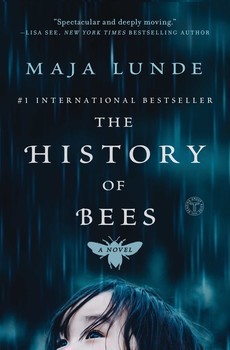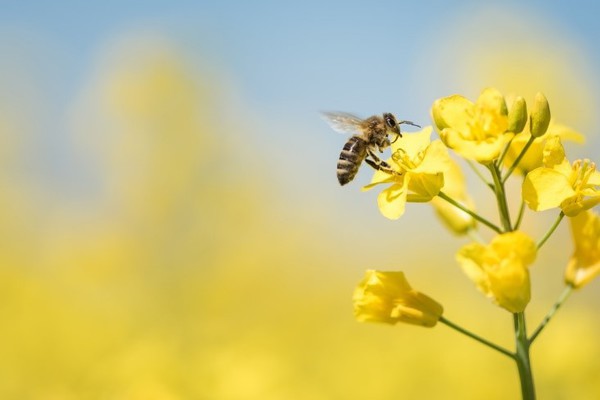"But why not examine the matter from a different perspective? For bees should not be made equal to man-they should be tamed by us, become our subjects." (Maja Lunde, The History of the Bees)
In which way and to what extent does man destroy nature?
Hermann Hausmann - 21.02.2019 @ 21:00
What would be without bees?
by Martin Mészáros and Zsanna Pásztói, DNG Budapest/Hungary
The book The history of the Bees is about a story of three families. The story is set in three different timelines, in the past, in the present and in the future. We can get an inside view of three parents and their relationships with their kids. The three stories have an important connection with bees. The main question is: What would happen with humans, if bees died out?
In Tao’s life, she lives in the future, we can get the answer to that question from the author. At the end of the 21st century, her job is to pollinate the fruit-trees because for some time, there have been no more bees to pollinate them. People haven’t found any ways yet to solve this problem. The author asks important questions, such as: How should people live their lives, what sort of decisions should they make and how should they act?
In what ways and to what extent do we destroy nature?

https://www.simonandschuster.com/books/The-History-of-Bees/Maja-Lunde/9781501161384
In our opinion, people have the biggest effect on nature. „There are more dominoes of the ecosystem that are falling or they already fell because of the damages the humans cause with their actions.” The bees have an important role in our lives, even if we can’t see it. It has an important connection with what can we put onto our table. Without bees, only the wind-pollinated plants would be left for us. That’s why massive bee extermination and pollution of nature are so serious problems, on what the author tries to attract the attention with her book. Only humans can solve this issue, but just when they change their lifestyles to „ecofriendly” ones. For example, people can reduce the release of greenhouse effect gases into the atmosphere.

https://geographical.co.uk/opinion/item/2701-conserving-honey-bees-does-not-help-wildlife
I really liked your article! I think, too, that the relationship between humans and bees is not right at the moment. In the past humans did not destroy the lives of bees by polluting the nature and generating the climate change. Nowadays, the bees suffer because of us. The book "The History of the Bees" makes very clear that we depend on bees and bees must not be tamed by us and become our subjects. In addition, the balance between humans and nature has to be reshaped; therefore, we need to change our lifestyle and reduce pollution, pesticides and the rising climate.
Charlotte Wittlich - 02.04.2019 @ 16:17
I really liked your article, the content of the book is well stated. It is a quite complicated book to explain, you did a great job.
The subject is really important, and as you said, it has to be more present in our daily lives, maybe the book can reach a bigger audience. People desperately need to change their behaviour to literally save the world, otherwise there won't be a world left to live in.
Anna Wischnewski - 30.04.2019 @ 16:23
I found your article well made and enjoyed it a lot, you explained it in a way that is easily understood and I would love to read this book now!
This is a very big problem in the world today and to see a different side of the consequences it can cause is a great way of proving to people how it effects us. This book shows that things we think will make small differences actually make big differences. Often books and articles show the biggest problems of the greenhouse effect, but they don't show all the small ones, but that could also be because we don't really see the small issues at all.
Audrey Hollingsworth - 09.05.2019 @ 10:58
I really enjoyed reading your article, it's easy to understand what you have written.
I think it's a very important subject that we need to focus on. I hope the book can reach everyone and make them understand that this subject is a big problem today and that we need to change/improve the situation. I agree with you, bees are a big part of us and our life. I think people know what a problem it is but they try to see it as a small issue.
Manar Al-Imarah - 10.05.2019 @ 13:05
I really liked your article, and I share your opinion.
With the book "The History of the the Bees" Maja Lunde wanted to point out the extinction of bees. I think with her book she has reached many people so far and the people who read the book will pay more attention to these tiny, wonderful, nearly unvisible, but very important creatures. After reading the book maybe more people will plant bushes and other plants, which are useful for bees in the garden. That could have a really positive effect.
We are destroying the seas by pollution. The earth consists of 70% of water, and only one percent of these 70 is the water we can drink. So many people haven't got enough water. But we live in Austria, we don't have to care about the scantiness of water, you will say. But one day our glaciers will disappear too, and it will be too hot for snow, but only after all these horrible things have happened, we will reflect our habits and our lifestye.
A few months ago I read a book called "Bis zum letzten Tropfen", which means translated into English something like "Down to the last Drop". It was written by Mindy McGinnies .
The book is about a girl, who lives on our destroyed earth, where water has become more valuable than gold. In the book she has to guard her most expensive treasure: her own spring, but it is more difficult to do that than she had ever thought. I really enjoyed reading it, but it was also terrifying because one day it could become reality.
Paula Jordan - 19.05.2019 @ 14:27
I enjoyed reading your article, because it touches a subject of huge importance. Human's actions cause irreversible earth damage and our generation is the first that fully understands this situation and the last that is able to do anything before it's too late. The population of mammals, birds, reptiles, amphibians and fish have decreased by 50% in last 40 years. The data is terrifying. As you said, we need to be more ecological. It's about the life of the next generations: if nothing changes, the earth warming will cause huge droughts and other cataclysms, there will be no water or food. Our children and their children will be struggling to survive.
What can we do? A single person can stop using plastic, choose recyclable things - for example glass, paper- use the bike instead of the car, stop travelling by plane. But is it enough? ,, Globally, fossil fuel-based energy is responsible for about 60% of human greenhouse gas emissions, with deforestation at about 18%, and animal agriculture between 14% and 18%." (https://skepticalscience.com/how-much-meat-contribute-to-gw.html) We need to make politicians decide right about the source of our energy, we need to lower our animal-based products intake and convince society to do so.
Thank you for your article. I will definitely read "The History of the Bees"
Jagoda Wnęk - 11.06.2019 @ 19:55
We've read your article "What would be without bees?" and we really enjoyed it. It was very well written.
The book covers a very uncommon but important question: What would happen in the world without bees? We think that this subject should be brought up more often, since it is something many people don't think about. When we read books about pollution, almost always the subject is the sea level, or droughts. The book you have written about is according to us a good tool to raise knowledge about flowers, bees, how they pollute and why it is so important.
We agree with your opinion that humans have the biggest impact on nature right now. The unresponsible behaviour humans have today is the biggest reason to carbon pollution, global warming and other climate disasters. If we don't change our lifestyles soon, maybe jobs like Tao's job will be reality in a few years.
Fruzsina Leéb - 03.10.2019 @ 13:54